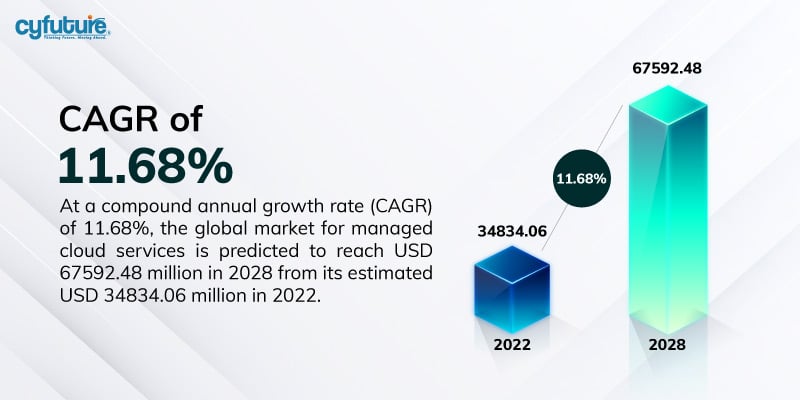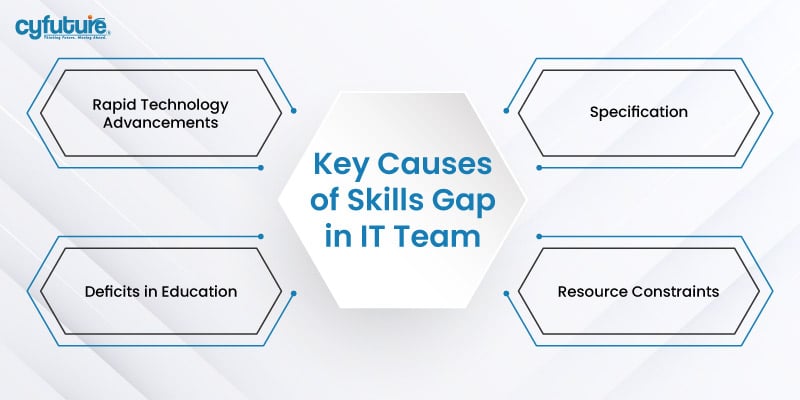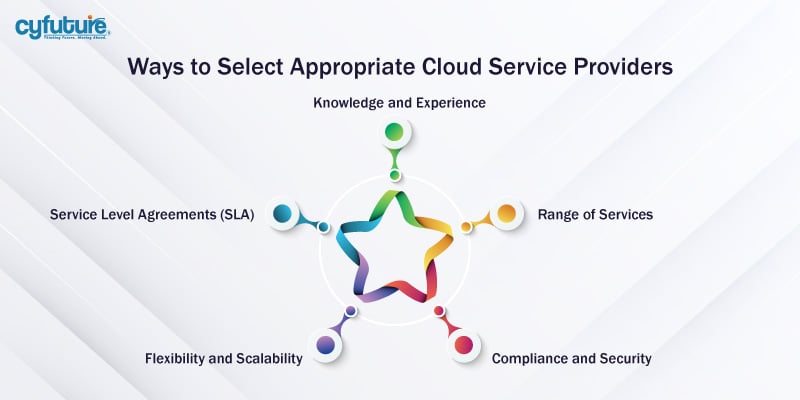-
Get Cloud GPU Server - Register Now!
Toggle navigation

According to a recent study – by 2026, it is anticipated that the global cloud computing market will be worth $947.3 billion.
To promote innovation, streamline processes, and preserve competitiveness in the ever-changing technological environment of today, cloud computing is becoming more and more crucial for all kinds of businesses. However, increasing reliance on cloud computing has additional challenges, the most significant of which is the inadequacy of IT teams.
When businesses go to the cloud, they frequently discover that the IT team they already have is not knowledgeable enough to manage and optimize cloud systems. This is where using managed cloud services is beneficial.
By using the experience of cloud service providers to close the skills gap in their IT staff, businesses can make sure they get the most out of cloud computing services.
However, let’s take a look into a few stats and data before delving deep.

Now, let’s see the factors and skills that use managed cloud services to bridge the skill gaps. So, let’s delve deep into the knowledge pool!
The term “skills gap” in IT teams refers to the differences between the abilities needed to effectively manage modern IT settings and the skills that IT professionals already hold. There is a bigger divide currently because of how rapidly technology is evolving, especially in the areas of cloud computing, cybersecurity, and data analytics.

IT workers frequently struggle to keep up with the quick speed at which new skills and technology are developed. One example of this difficulty is cloud computing, which offers a constantly changing ecosystem of services and solutions.
For cloud settings, a working knowledge of cloud architecture, security, compliance, and DevOps is necessary. If conventional IT staff is lacking in this kind of experience, there may be a vacuum in the knowledge.
Graduates from traditional schools might not be adequately prepared for the demands of today’s IT jobs, especially those that make use of cloud computing services. The skills that are taught, and the skills needed in the job, diverge as a result.
The skills gap may be exacerbated by the fact that many companies, especially small and medium-sized enterprises (SMEs), may not have the funds to invest in the continuous training and upskilling of their IT staff.
Managed cloud services are provided by specialized cloud service providers (CSPs), who handle cloud administration and operations on behalf of their clients. By offering a range of services, including infrastructure management, security, monitoring, and support, these companies let businesses concentrate on their core competencies while gaining access to the knowledge and expertise of seasoned cloud experts.
Businesses may access a pool of highly skilled cloud professionals with managed cloud services. These experts manage complex cloud environments with extensive experience, and they stay up to date with the latest advancements in cloud technology. Companies that work with a CSP can access this information without spending money on internal training programs.
CSPs offer solutions that are flexible and adaptable to a company’s specific needs. Thanks to this flexibility, large internal resources are no longer necessary, which allows businesses to scale up or down their cloud operations depending on demand. Businesses can handle their cloud infrastructures more effectively and efficiently as a result.
Compared to hiring and training new staff, investing in managed cloud services might be less expensive. Pay-as-you-go and subscription-based services are only two of the price models that CSPs provide; these options are more affordable for businesses with limited funds. By guaranteeing resource efficiency and preventing unnecessary expenditures, CSPs may also help reduce cloud costs.
Complying with regulations and maintaining security are crucial aspects of cloud management that require expert knowledge. Security professionals who are adept at creating robust security measures, conducting regular audits, and upholding industry compliance are employed by CSPs. In addition to ensuring that businesses adhere to legal requirements, this lowers the chance of security breaches.
Companies that contract out cloud management to CSPs can free their internal IT staff to focus on important business duties and strategic initiatives. This makes it possible for businesses to foster innovation and growth without being hindered by the difficulties associated with managing cloud computing.
A wide range of solutions, each designed to address a particular aspect of cloud management, are included in managed cloud services. Among the crucial services are:
Provisioning, setting up, and managing cloud resources such as virtual machines, storage, and networking is known as cloud infrastructure management. It is the responsibility of CSPs to guarantee that cloud infrastructure is optimized for reliability, performance, and affordability. This service is especially helpful for businesses whose internal knowledge is insufficient to manage complex cloud configurations.
Security is a top concern for businesses that use cloud computing. Complete security management, comprising threat identification, vulnerability evaluations, data encryption, and compliance tracking, is offered by managed cloud services. Cloud service providers employ cutting-edge security protocols and technology to protect cloud environments from online threats.
The continuous observation of cloud resources and performance data is the responsibility of cloud monitoring and analytics. CSPs make use of advanced monitoring systems to identify potential issues, enhance resource efficiency, and provide useful information. Businesses may continue to achieve high performance and availability levels with this solution.
Backup and disaster recovery services guarantee that businesses can quickly bounce back from system failures or data loss. Replication of data, regular backups, and failover procedures are all part of the robust disaster recovery plans that CSPs develop and implement. This service is essential to maintaining business continuity even in the event of unforeseen setbacks.
Cloud app development and deployment are made simpler by automation and DevOps services. CSPs employ automated processes for infrastructure as code (IaC), continuous delivery, and continuous integration. This guarantees reliable and consistent deployments and expedites the development process.

To fully benefit from managed cloud services, selecting the right cloud service provider is essential. The following are some crucial factors to take into account while choosing a CSP:
Seek out a CSP that has experience effectively administering cloud configurations that are similar to your own. Take into account their background in your industry and familiarity with certain cloud computing platforms (such as AWS, Azure, and Google Cloud).
Make sure the whole range of services offered by the CSP satisfies the needs of your business. Infrastructure management, security, monitoring, disaster recovery, and DevOps are all included in this.
Verify if the CSP is capable of helping you adhere to relevant laws and regulations and has put in place strong security measures. Ask about the auditing processes and security certifications they have.
Select a CSP that can adapt to your business’s changing demands and scale its services to keep up with its growth. Seek pricing options that you may modify based on your spending and consumption patterns.
Evaluate the CSP’s level of help, taking into account their availability and reaction times. Make sure their SLAs meet the availability and performance requirements of your company.
Managed cloud services are expected to become more and more important in assisting companies in closing the skills gap as cloud technology develops. Among the new patterns to keep an eye on are:
To improve automation, predictive analytics, and security, CSPs are integrating AI and machine learning into their offerings. These tools may assist companies in making data-driven choices, anticipating and reducing risks, and optimizing cloud performance.
As companies look for ways to process data closer to the source to save latency and boost efficiency, edge computing is becoming more and more popular. Edge computing solutions will be added to managed cloud services, allowing companies to employ this technology without requiring in-house knowledge.
To avoid vendor lock-in and boost resilience, businesses are increasingly utilizing multi-cloud and hybrid-cloud solutions. To manage these intricate settings and ensure seamless integration and optimal performance, CSPs will provide more comprehensive services.
CSPs want to invest in advanced security solutions including zero-trust architectures, encryption, and privacy-enhancing technologies in response to the growing danger of cyberattacks. This will help companies safeguard their information and make sure that strict regulations are followed.
CSPs will focus on providing sustainable cloud solutions as a result of growing awareness of environmental issues. This entails boosting data center productivity, utilizing renewable energy sources, and offering instruments to help businesses evaluate and reduce their carbon impact.
Predictions indicating the global cloud computing market would reach $947.3 billion by 2026 provide evidence of the cloud’s rising importance in business. That being said, the biggest barrier to this growth is inexperience with IT teams.
Many organizations learn that the IT staff is not equipped with the knowledge and abilities needed to manage and enhance cloud resources. The experience of cloud service providers may be used by managed cloud services to help close this gap. The scalable, reasonably cost solutions offered by these suppliers increase security and free up teams to concentrate on their strengths.
Managed cloud services provide a means of closing the IT skills gap and allowing companies to fully utilize cloud computing capabilities. Collaborating with competent cloud service providers may help businesses save expenses, maintain security and compliance, and get the knowledge and experience needed to run complicated cloud systems.
If the demands of cloud computing are becoming too much for your IT team to handle, you may want to consider working with a reliable cloud service provider. Visit our website or get in touch with us for a consultation to see how Managed Cloud Services may help your business.
Yes, it may be less expensive than hiring and training new staff members, with customizable pricing plans that reduce unnecessary spending and scale with business needs.
Indeed, suppliers often have a wide range of specializations and offer tailored solutions to meet specific operational, regulatory, and compliance needs.
Yes, since Managed Cloud Services providers take care of daily operations and technical issues, your IT personnel can focus on innovation and strategic goals.